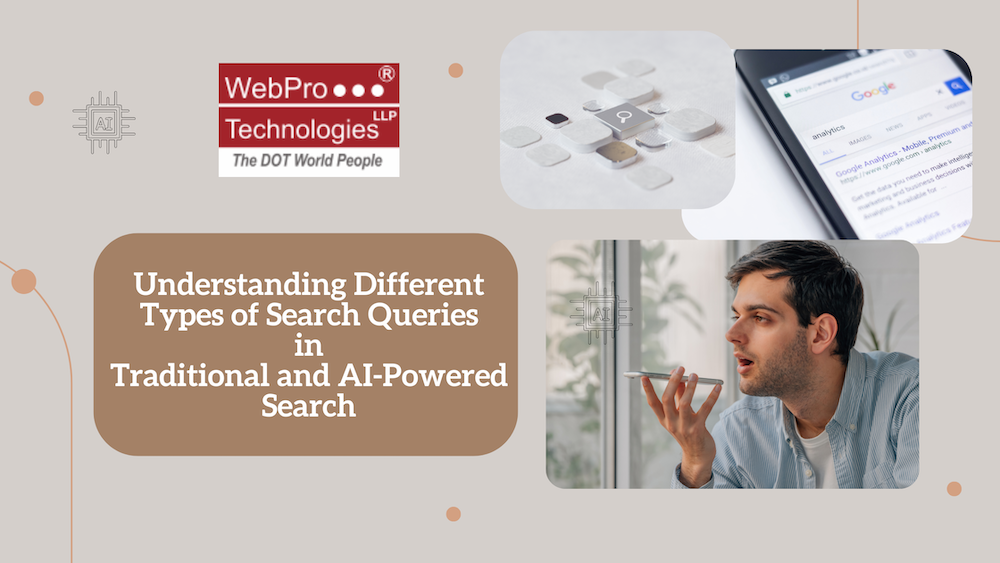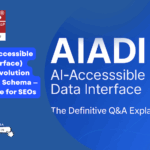Search queries are the foundation of how people interact with search engines, helping them find information, products, services, and answers to their questions. With the evolution of search engines—especially the rise of AI-powered search, such as Google's AI Overviews and ChatGPT-powered browsing—the way search queries are processed and results are delivered has significantly changed.
One of our previous posts in 2015 on different types of search queries, emphasized the importance of understanding the different types of search queries to enhance a website's search presence and effectively plan content strategies.
It categorized search queries into various types, such as
- Brand searches
- Product-related questions
- Comparisons between products
- Regional terminology differences
- Exact match searches
- Phonetic spelling errors
- Need-based searches
- Descriptive searches
- Local intent queries
- Format-specific queries
- Personal name searches
- Price-related searches
- Review and rating searches
- Profession-related queries
In contrast, the article below provides an in-depth analysis of search queries, categorizing them into
- Traditional
- Navigational
- Informational
- Transactional
- Local search
- Voice search
- comparative/research-based queries—and explores their significance in traditional search engines.
It also delves into AI-driven search, introducing categories like :
- Conversational queries
- Multi-turn queries
- Summarization queries
- Generative/exploratory queries
- Action-oriented queries
- Personalized/context-aware queries
- This analysis highlights the evolving nature of search behavior with the advent of AI-powered search tools and offers insights into adapting SEO strategies accordingly.
Let's explore the different types of search queries, their importance, and how they are categorized based on traditional search and AI-driven search.
Types of Search Queries in Traditional Search
In traditional search engines like Google and Bing, queries are generally categorized into three main types:
1. Navigational Queries
- Users search for a specific website or brand.
- They already have a destination in mind.
- Example:
"Instagram login""OpenAI website""Nike official store"
SEO Importance:
- Websites should ensure their brand ranks at the top for navigational searches.
- Paid ads may appear for branded searches, which companies should monitor.
2. Informational Queries
- Users seek answers, definitions, or knowledge.
- These are non-commercial and focused on research.
- Example:
"What is Python programming?""How to bake a cake?""Symptoms of flu vs. COVID-19"
SEO Importance:
- Content marketing and blog strategies target these searches.
- Featured snippets and People Also Ask (PAA) sections are crucial for visibility.
- Voice search often relies on informational queries.
3. Transactional Queries (Commercial Intent)
- Users are looking to complete an action, such as making a purchase or signing up.
- These queries indicate high intent.
- Example:
"Buy iPhone 16 Pro Max online""Best hosting service for WordPress""Subscribe to Netflix premium"
SEO Importance:
- Landing pages and product pages must be optimized for these searches.
- Google Ads and paid campaigns focus on high-intent keywords.
- Reviews and social proof help in conversion.
4. Local Search Queries
- Users look for businesses, services, or locations nearby.
- Often includes
"near me"or location-based terms. - Example:
"Best pizza place near me""24/7 pharmacy in India""Car repair shop in Mumbai"
SEO Importance:
- Local SEO and Google My Business (GMB) optimization are crucial.
- Reviews, local citations, and NAP (Name, Address, Phone number) consistency help in ranking.
5. Voice Search Queries
- Often conversational, long-tail, and phrased as questions.
- Example:
"What's the weather like today in Ahmedabad?""Where can I buy organic coffee beans?"
SEO Importance:
- Content should be optimized for natural language and long-tail keywords.
- FAQ schema markup can help in ranking for voice search.
6. Comparative and Research-Based Queries
- Users compare two or more products, services, or concepts.
- Example:
"iPhone 15 vs. Samsung S23""Best budget laptops under $1000""Is Netflix better than Amazon Prime?"
SEO Importance:
- Listicles, comparison blogs, and detailed guides perform well.
- Affiliate marketing and product review sites benefit from these queries.
Types of Search Queries in AI-Driven Search (AI Overviews, ChatGPT, Perplexity AI, etc.)
With AI-powered search, search engines use natural language processing (NLP) and machine learning to generate more conversational, direct, and summarized results. AI-generated responses often reduce the need for users to click on multiple links.
Here’s how search queries are categorized in the AI search landscape:
1. Conversational Queries
- AI search is designed to interact naturally with users.
- Instead of keyword-based searches, users phrase queries as complete sentences.
- Example:
"Can you recommend a good laptop for video editing?""What’s the best way to lose weight naturally?"
SEO Impact:
- AI-generated responses pull from authoritative sources.
- Structured data and credibility (E-E-A-T) help content appear in AI overviews.
2. Multi-Turn Queries (Follow-up Context Retention)
- Users ask follow-up questions related to their previous queries.
- Example:
- User:
"What is Python?" - AI Search Response: Gives an overview of Python
- User:
"How do I use it for web development?"
- User:
SEO Impact:
- Traditional keyword targeting may not be enough.
- Websites need to provide comprehensive and related content clusters.
3. Summarization Queries
- Users ask AI search to summarize long articles, books, or topics.
- Example:
"Summarize the book Atomic Habits""What are the key takeaways from Apple's latest event?"
SEO Impact:
- AI Overviews may reduce direct clicks to websites.
- Websites must provide unique insights that AI summaries cannot replicate.
4. Generative and Exploratory Queries
- Users seek unique AI-generated ideas or content.
- Example:
"Give me 10 creative blog post ideas about AI in marketing.""Can you generate a 5-day keto meal plan?"
SEO Impact:
- AI may generate answers instead of showing search results.
- Brands need to create original, high-quality, and AI-resistant content.
5. Action-Oriented Queries
- Users ask AI search to perform specific tasks.
- Example:
"Create a travel itinerary for a 7-day trip to Japan.""Generate a Python script for web scraping Amazon data."
SEO Impact:
- AI models may replace traditional informational search pages.
- Sites offering unique tools, templates, and interactive elements can attract AI-powered traffic.
6. Personalized and Context-Aware Queries
- AI considers user history, preferences, and real-time context.
- Example:
"What’s the best coffee shop near my location?""Give me a beginner-friendly guide to learning SEO."
SEO Impact:
- Hyper-personalized content and recommendation engines will be more valuable.
- SEO must account for context-driven search behavior.
Comparing Traditional and AI-Powered Search Queries
| Category | Traditional Search | AI-Powered Search |
|---|---|---|
| Query Structure | Short keywords, structured search | Conversational, long-form |
| Results Display | List of ranked links | Summarized AI-generated answers |
| Follow-up Queries | Requires new searches | Multi-turn conversation allowed |
| Intent Recognition | Based on keywords & intent groups | Uses AI and machine learning |
| User Engagement | Click-through-based | Direct answers with fewer clicks |
| SEO Strategy | Keyword optimization, backlinks | E-E-A-T, structured data, originality |
How to Adapt to the Changing Search Landscape
- Optimize for AI Overviews – Focus on structured data, trustworthiness, and long-form content.
- Create Conversational Content – Write in a way that aligns with natural language processing.
- Enhance Personalization – Use first-party data and behavioral insights to tailor content.
- Provide Unique Value – AI-generated responses are based on existing content, so offering unique insights, original research, and interactive experiences will differentiate your site.
- Leverage AI for SEO – Use Python and AI-powered tools to analyze search trends, optimize content, and automate SEO processes.
While traditional SERPs are evolving, SEO is far from dead. Adapting to AI-driven search behaviors will ensure long-term visibility and success.
Author
-
Bharati Ahuja is the Founder of WebPro Technologies LLP. She is also an SEO Trainer and Speaker, Blog Writer, and Web Presence Consultant, who first started optimizing websites in 2000. Since then, her knowledge about SEO has evolved along with the evolution of search on the web. Contributor to Search Engine Land, Search Engine Journal, Search Engine Watch, etc.
View all posts







